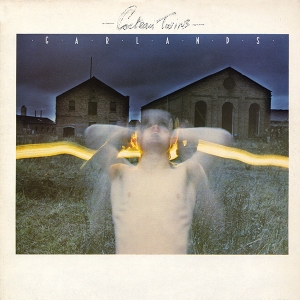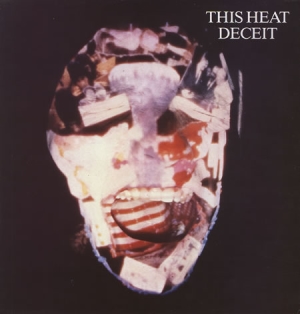
Datblygu were a Welsh experimental rock group formed in 1982. They are regarded as a catalyst of the new wave of Welsh rock in the early 1980s.

The Motors were a British pub rock band formed in London in 1977 by former Ducks Deluxe members Nick Garvey and Andy McMaster together with guitarist Rob Hendry and drummer Ricky Slaughter. Their biggest success was with the McMaster-penned song "Airport", a number 4 UK hit single in 1978.

Garlands is the debut studio album by the Scottish alternative rock band Cocteau Twins. It was released on 10 July 1982 through the record label 4AD. It peaked in the Top 5 of the UK Independent Albums Chart and received support from BBC Radio 1 radio host John Peel.
Scorn is an English electronic music project. The group was formed in the early 1990s as a project of former Napalm Death members Mick Harris and Nic Bullen. Bullen left the group in 1995 and the project continued on until the end of 2011, as an essentially solo project for Harris. Harris restarted the project in 2019.

The Madcap Laughs is the debut solo album by the English singer-songwriter Syd Barrett. It was recorded after Barrett had left Pink Floyd in April 1968. The album had a lengthy recording history, with work beginning in May 1968, but the bulk of the sessions taking place between April and July 1969, for which five different producers were credited − including Barrett, Peter Jenner, Malcolm Jones, and fellow Pink Floyd members David Gilmour and Roger Waters. Among the guest musicians are Willie Wilson from Gilmour's old band Jokers Wild and several members of Soft Machine.

This Heat were an English experimental rock band, formed in early 1976 in Camberwell, London by multi-instrumentalists Charles Bullen, Charles Hayward and Gareth Williams.

Charles Hayward is an English drummer and was a founding member of the experimental rock groups This Heat and Camberwell Now. He also played with Mal Dean's Amazing Band, Dolphin Logic, and gigged and recorded with Phil Manzanera in the group Quiet Sun project as well as a short stint with Gong. He was a session musician on The Raincoats' second album, Odyshape, and on one occasion played drums for the anarchist punk band Crass. Since the late 1980s, Hayward has released several solo projects and participated in various collaborations, most notably Massacre with Bill Laswell and Fred Frith.

Deceit is the second and final studio album by English experimental rock band This Heat, released in September 1981 by Rough Trade Records. As with their self-titled debut album, the tracks on Deceit were assembled from largely improvised recordings that the band accumulated since their inception in 1976, with varying degrees of audio quality. However, it is generally considered to be more song-oriented than its largely abstract predecessor. The title is in part a pun on the band's name.

Love's Secret Domain is the third studio album by the British experimental band Coil, released in 1991. The singles released from the album were "Windowpane" and "The Snow". Guest vocalists include Marc Almond on the song "Titan Arch" and Annie Anxiety on the song "Things Happen".
Unseen Terror was a British extreme metal band formed by Mitch Dickinson (Heresy) and Shane Embury, and played extreme metal with a technical edge along with elements of hardcore punk. Their most notable feat took place in March 1988, when they recorded tracks for John Peel's BBC Radio 1 program.

Po! are an indie rock band formed in Leicester, England in 1987, with releases dating up to 1998 on Rutland Records, Sunday Records in the US and Elefant Records in Spain.
The Joy Division Peel sessions are a series of sessions recorded by English post-punk band Joy Division for John Peel's radio show on BBC Radio 1 between January and November 1979.
Camberwell Now were an English avant-prog band from London, formed in 1982 after the demise of This Heat.

This Heat is the debut studio album by English experimental rock band This Heat. Recorded between 1976 and 1978, it was released in September 1979 by record label Piano.
Gareth Williams was a British musician best remembered as the bassist and vocalist for the experimental rock group This Heat.

One Step Beyond. .. is the debut studio album by the British ska-pop group Madness, released by Stiff Records. Recorded and mixed in about three weeks, the album peaked at number two and remained on the UK Albums Chart for more than a year. The album has received much critical praise. It was ranked 90th in a 2005 survey held by British television station Channel 4 to determine the 100 greatest albums of all time.

Health and Efficiency is an EP by English experimental rock band This Heat. It was released in 1980 by record label Piano.

Randolph's Leap is an eight piece indie-pop band from Glasgow, Scotland, and signed to Lost Map Records as of 2014. Founded by frontman Adam Ross in 2006, members include Ross (guitar/vocals), Adam Florence (drums), Vicki Cole (bass), Andrew MacLellan (guitar), Heather Thikey (violin), Pete MacDonald (keyboards), Ali Hendry (trumpet) and Fraser Gibson (trombone).

The End of Radio is a 2019 album by Shellac. The album contains two previously unreleased recordings made for the BBC Radio One's John Peel Show in 1994 and 2004. Steve Albini has spoken about his admiration for John Peel, stating that "he listened religiously to every single record he received in the mail, devoting hours of every day to the task".
David Bowie recorded twelve radio sessions for the BBC between 1967 and 1972. Many of the tracks – but not all – were released on the Bowie at the Beeb 2-CD Set (2000). Some of the tracks missing from the first few sessions not included on Bowie at the Beeb 2-CD Set appear on later editions of David Bowie (1967) and David Bowie (1969). A few more tracks appear on BBC Sessions 1969–1972 (Sampler) [1996]; Bowie at the Beeb 4-LP Edition [2016]). However, many of the missing tracks from the Bowie at the Beeb 2-CD Set are only available on bootlegs and online. 'Hang Onto Yourself' from 11 Jan 1972 has,to date, not appeared in either master tape or bootleg form. This is because many of the original mastertapes are long gone, with sometimes only the broadcast tapes existing, meaning songs that were recorded but not originally broadcast, or only broadcast in edited form, are lost; or in at least one case, only a partial recording of a broadcast exists, with the broadcast tape no longer available. This article gives an overview of all the sessions, along with where they have received their official release.














